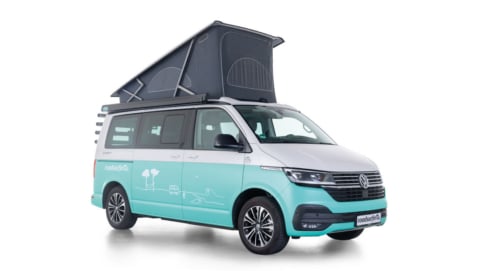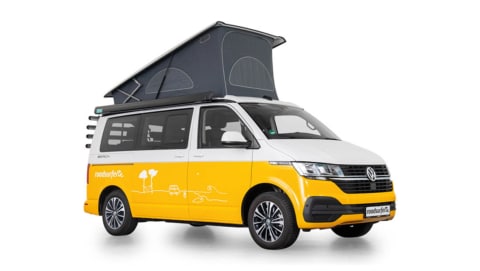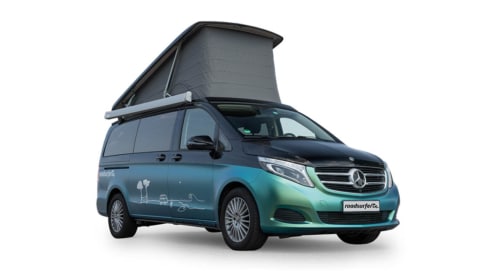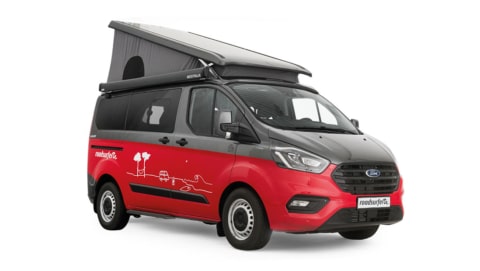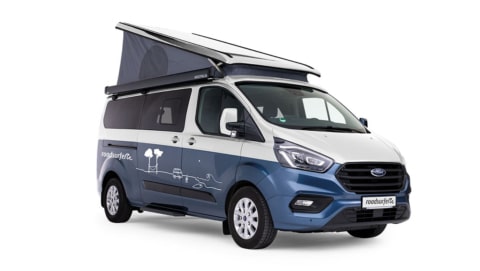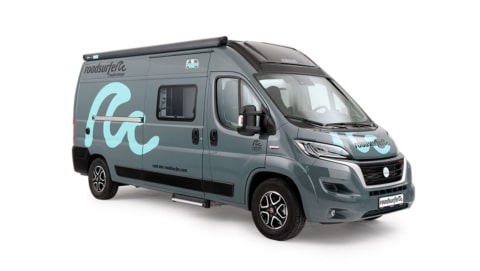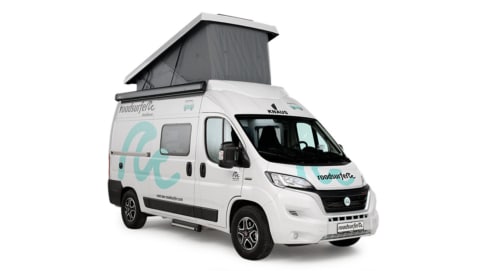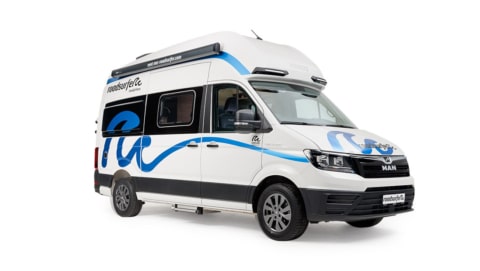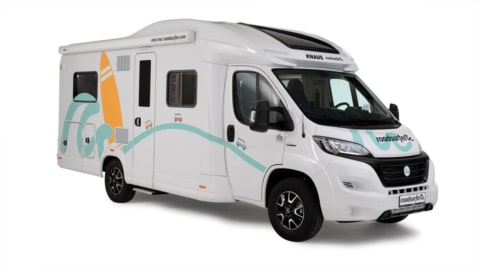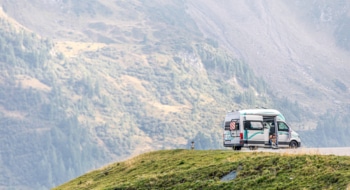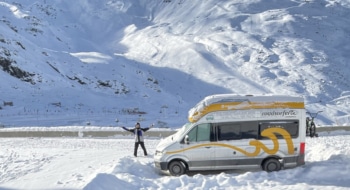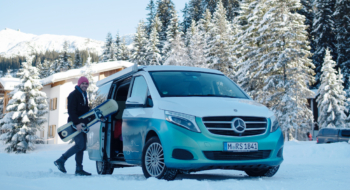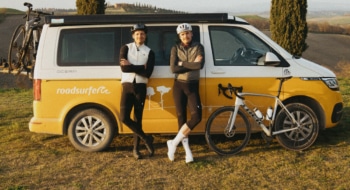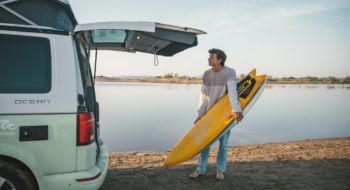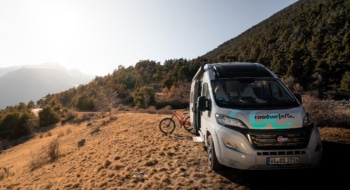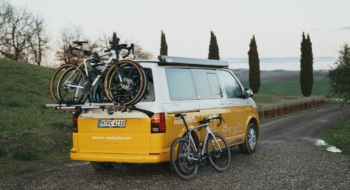How to Use Your Campervan Heater in Winter
A campervan heater is not only perfect for a winter’s camping adventure in the snow, but also offers a lot of comfort for late summer nights or short trips to the mountains. Read on to find out how the heater works in our campervans and motorhomes, how to heat correctly and which mistakes to avoid.

roadsurfer GmbH / berriesandpassion
Overview
How the heaters work
The two most common heaters are the diesel heater and the gas heater, though the gas heater is currently the most popular. Both models are air heaters and work in the same way: a burner, powered by electricity, heats the air, which is then distributed inside the vehicle by a fan. The difference between gas and diesel heating is that gas heating uses liquid gas as fuel and diesel heating uses diesel as fuel. The heater, like your air conditioner, is operated via a control element in the motorhome.
Differences between gas heating and diesel heating
It is not possible to make a general statement about which parking heater is better, and it depends entirely on the individual needs and behaviour of the user. However, there are differences that can make a decision easier.
As already mentioned, the most commonly used heater is currently the gas heater. The clear advantage here is that its performance is very reliable, it is very quiet compared to diesel heating and it also requires little maintenance. Heating with gas also has no effect on the fuel consumption of your tank and is fed from liquid gas bottles that are stored and connected in the motorhome.
This does have an impact on the storage space of your campervan. A medium-sized 11-litre bottle weighs a hefty 22 kg and having a spare bottle with you is recommended for longer holidays. Since the heater runs on gas, this also means that it has to be refilled when it is used up. This can sometimes be a real challenge, especially abroad, as there are no uniform standards for gas bottles across countries. However, this can be solved with an adapter kit. So if you are going on a longer trip, find out about the country-specific conditions in advance.
If you have a heating system that runs on diesel, you are guaranteed to save some storage space compared to the gas heater, because the diesel heating system uses diesel directly from the fuel tank, which is fed to the heating system by a diesel pump. In contrast to the gas heater, which requires less electricity to transport the fuel to the heater due to the pressure in the gas bottle, the electricity consumption of the diesel heater is somewhat higher. On the other hand, diesel is easily available at any petrol station, making the diesel heater an uncomplicated and reliable companion for longer trips and also for camping in very cold weather.
Energy consumption
How much electricity, diesel or gas is ultimately consumed depends on many factors. These include the outside temperature, the insulation of the vehicle, the size of the interior and the heating temperature. The heating power of a gas-powered heater empties a bottle of liquid gas in about 1-3 days of heavy use. Due to its availability and size, the gas heater is therefore more suitable for milder camping trips. With the diesel parking heater, you average about 12 Litres per day at the highest level. With a much larger tank, this means a few days more without having to fill up the diesel. But be careful not to use it all up for heating power, so you still have some diesel left over for the trip to the next petrol station!
roadsurfer campervans with diesel heating
Try our our vehicle models with diesel heating and nothing will stand in the way of your winter exploration. Choose from our selection of campervans like the Surfer Suite, Beach Hostel, Travel Home or the Camper Cabin / Camper Cabin Deluxe. Or, for cosy trip for two, select a diesel heating motorhome like our Couple Cottage.
roadsurfer Motorhomes with gas-powered heaters
If you decide on a larger motorhome, you can even choose between gas or diesel heating on some models, such as our Road House, the Family Finca, or the Camper Castle. As it does not have a pop-up roof, the good insulation supports the heating performance of your gas heater and keeps consumption down. By the way, these four models come with a wet cell with hot water!
Not sure which vehicle to choose? Compare the roadsurfer fleet here!
Our conclusion on gas and diesel heaters
Whether a gas or diesel heater, each heater has its own advantages and disadvantages and these depend entirely on the type and extent of use. However, our conclusion is that a heater provides a comfortable indoor climate, especially in cold temperatures and in winter, and, if used correctly, is also good for your motorhome in the long term. Here are a few tips on how you can heat sustainably:
- Ventilate regularly so that moisture can escape with the warm air.
- Heat continuously to avoid high electricity consumption when the heating starts. The diesel auxiliary heating in particular should run even when the window is open for a short time, rather than being switched off and on, in order to avoid the high power consumption of the diesel pump during the start-up phase.
- Reduce the temperature at night. It is easier to sleep at night and a little fuel is also saved.
Enjoy the benefits of camping with heating and start looking forward to winter now. If you need some tips for winter camping, we have some recommendations for you here!
Insider tips for your Road Trip
Start your adventure!
Travel smarter with roadsurfer.
Trusted by thousands of travelers worldwide.
✓ Backed by 15,000+ Google reviews
✓ Built for families, couples & adventurers
✓ Inspiration & exclusive deals for subscribers
